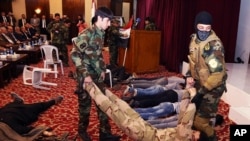In an online “Isis Bloopers” video, a “terrorist” bungles his lines until his “victim”- dressed in orange prison gear - helps him get his speech to U.S. President Barack Obama just right.
“If you want the killing to stop, you give us $10 million, change your name to Mohammad and kill Justin Bieber,” the actor playing the terrorist says.
The video may be offensive to some, making light of recent brutal public murders; but, for others, taunting the self-proclaimed Islamic State is a direct attack on the militant group. And as reports from the “inside” grow increasingly bizarre, some analysts say mockery is now a powerful weapon of war.
“One of the ways to undermine any power in the world is through jokes, through mockery,” says Said Sadek, a political sociologist with The American University in Cairo. “Mockery is the best weapon to undermine a powerful or tyrannical figure or organization.”
In the past year, social media have become awash with videos, music, tweets and jokes taunting the Islamic State group like a collective cry of “Who’s Afraid of the Big Bad Wolf.”
Videos made by the Islamic State group sometimes also draw laughter, like one that appears to show inept militants “training,” showing off their beginner level karate. Others videos, more terrifying but equally bizarre, show what appears to be the murders of gay men by stoning or tossing them off buildings. In one such video, militants embrace the victims before stoning them to death, apparently forgiving them.
Despite these propaganda fails, one of the reasons the Islamic State group has been able to take over - and largely hold - vast territories in Iraq and Syria has been its sophisticated use of social media, according to Sadek.
“Sometimes you win, sometimes you lose with propaganda,” he says. “Until very recently they had some of the best and sophisticated propaganda machines of any terrorist group we have seen before.”
The Islamic State group's media savvy has been undermined by all the laughter, he says, and he believes the group is on the decline. Even the most optimistic observers, however, assume it will be several years before the Islamic State can be defeated, he cautions.
Such a defeat is increasingly a worldwide concern, he says. Wars and abject poverty in the Middle East and Africa are driving people onto rickety boats to Europe at unprecedented rates, raising fears that jihadists may be hiding among the ranks.
The group claims it has 70 “soldiers” inside the United States. It also claims responsibility for an attack in the U.S., according to SITE Monitoring Service, a Jihadi watchdog group.
Australian Foreign Minister Julie Bishop warned Tuesday the group’s power base could still be growing. "In relation to Daesh, we are deeply concerned about the rise of this terrorist organization that appears to be more dangerous, more complex, more global in its ambitions and reach than perhaps we've seen before,” she said on Tuesday.
“The declaration of a caliphate of parts of Syria and Iraq is a rallying cry for extremists around the world," she added.
In her choice of words, Bishop calls the group by the name “Daesh” rather than the Islamic State, or various other English acronyms. It is an Arabic acronym for “Islamic State,” insulting because it is a word-form normally reserved for criminals in Arabic.
Besides mocking the Islamic State group with words, the militants are also mocked for their use - or misuse - of words. For example, last month newspapers and social media took notice when the Islamic State in one area reportedly banned Nike-brand clothing because the word Nike sounds similar to a particularly dirty word for sex in Arabic.





